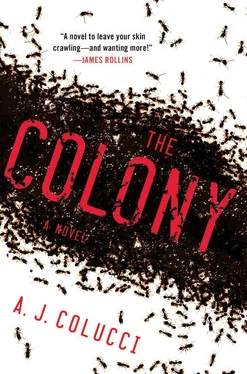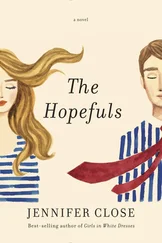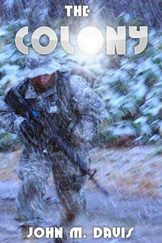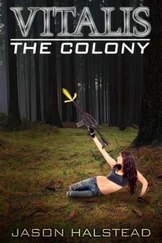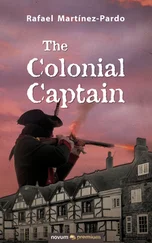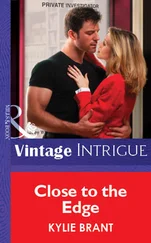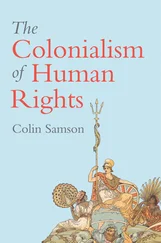“Right.”
The chief backhanded the sergeant’s shoulder. “Who’s that?”
Poking around the bodies was a man in a lab coat and latex gloves. The sergeant shrugged. “Some ant guy the mayor sent over. Probably another one of his cronies who won’t give us a goddamn thing.”
The chief sighed and stepped off the curb. The stranger squatted over the bodies with a pair of tweezers. He raised a dead ant to the sun and dropped it into a bag, just as the cop reached the corpses’ shoes.
“Chief Scotty Harris. Can I help you?”
Paul peered up with affable brown eyes and offered a business card. “Paul O’Keefe.”
“Mayor sent you?”
“Just getting some samples.”
The chief glanced at the card and read, American Museum of Natural History. “You gonna put these things in a display case?”
“I’m purely research.”
He stooped down next to Paul. “So what, are these some kind of fire ant? That’s what the last guy told us, when they killed that couple in the park.”
Paul didn’t answer. “Mind if I open the guy’s mouth?”
“Forensics hasn’t arrived.” Harris motioned to a cop standing guard over the bodies and asked, “They take photos yet?”
“Half hour ago,” the cop replied.
“What the hell,” Harris said, disgusted. “Mayor’s running this show.”
He pulled the sheet back slightly from the victim’s head and Paul winced. The skin of the dead man was shiny white and swollen to the point of resembling whale blubber, the features hardly discernible as human. Thickened blood protruded from orifices and deep cracks in his flesh. The eye sockets were empty and the one remaining eyeball hung like a wet strawberry from fibrous membranes.
Paul opened the mouth with a tongue depressor. The cavity was crammed with ants, mostly dead, but three crawled across the lips.
Harris stumbled back, nearly losing his balance. “Damn. They’re alive.”
Paul ripped off a glove with a snapping sound and scooped the ants with the tongue depressor, then sprinkled them onto his naked palm.
Harris was startled by the risky move but had a feeling this had become routine for Paul. The ants were unperturbed and seemed to be cleaning their antennas with nimble legs. The cop strained to get a look. “Huh. Not a bite. Guess they must be stuffed from eating this guy.”
“Maybe.”
From his breast pocket, Paul retrieved a Genetic Barcode Reader; a shiny silver device with a touch screen and small square hole at the base. It worked on the same principal as a barcode scanner at the supermarket but instead of recognizing line patterns on vegetable cans and packs of poultry, the scanner sequenced strands of DNA and could identify any plant or animal on earth from a database of 10 million species.
Paul retracted a stylus from the side and used it to crush one of the ants into the hole. The screen lit up and numbers and letters streamed by like ticker tape. When it stopped, he peered down at the screen and frowned. SPECIES: NEGATIVE.
“Thank you.” He stood up, a head taller than the chief, and extended his hand.
Harris shook it, but then held on firmly, his expression pleading for mercy. “C’mon, guy. You gotta give me something.”
Paul could hear the heavy weight of desperation in the cop’s voice. His ruddy face was pinched with lines of worry that stretched from his receding hairline to the bridge of his bulbous nose. Paul looked past the police badge to the early dawn creeping over the skyscrapers and wondered what new horror the day would bring.
“I’m sorry.” His eyes showed he truly was. Paul headed toward the uptown subway.
The chief eyed the cadaverous mass on the sidewalk and watched a few ants crawl out from beneath the sheet. A couple stragglers drifted toward his shoe and he backed off, kicking up gravel.
“Hey!” he called out. “Just tell me one thing. Is there anyone out there who can kill these sons of bitches?”
Paul was already gone.
Las Cruces, New Mexico
THE CHIHUAHUAN DESERT WAS alive with early morning sounds of coyotes, ravens and warblers. It was already hot—maybe 82 degrees—but a slight wind blew west off the Rio Grande.
A Quonset hut stood in the sand, lonesome in the middle of nowhere, its oblong solar panels reaching up to the sky. Inside it was still quiet and dark, but a sleek gecko, camouflaged with brown and yellow blotches, scampered lightning quick across the gray cement floor like a paratrooper in fatigues. It raced up the side of a bed to a pillow, across a sweaty cheek, and came to rest on a full, sensual pair of lips.
“Feh! Feh! Oh, guck!” Professor Kendra Hart sat up spitting, with sharp blue eyes focused and alert. She wiped the feeling of slime from her mouth and lifted the lizard to eye level. “That was a dirty trick, Darwin.”
Kendra glanced at a retro Atom Ant alarm clock on a side table.
It was five-fifteen. Late again.
“Okay, pal, you’re off the hook this time. But if that’s your way of coming on to me, I’ve got to tell you, I’m partial to the warm-blooded type.”
She threw off the linen sheet and froze. Slithering across the floor was a six-foot king snake; a sleek pattern of gold diamonds glowed as bright as its milk-white eyes. Kendra kept utterly still as the serpent side-winded out of the shadows toward the bed.
She narrowed her eyes. There was something odd about this snake. A lump the size of a baseball swelled above its midsection. Kendra whipped around to a stack of metal cages. Through the bars she could see the plodding movements of a fat Sonoran toad, the silhouettes of a screech owl, iguana and chuckwalla. The smallest cage—home to a desert rat—was upside down on the floor, open and empty.
“Chomps!” she yelled, flashing back to the snake. “You ate Socrates!”
The unperturbed reptile slithered past her, as the suspicious lump moved farther down its gut.
Kendra sighed, letting her bare feet touch the cool floor. She would have to consider finding a better circle of friends. And it wasn’t just the eating-each-other thing. Lately, she’d been talking to herself, having casual conversations and even arguments. Perhaps the solitary life of the desert was becoming a little too solitary.
“That’s insane,” she said aloud. “You’ve never been happier.”
Kendra lifted her body with a yoga stretch, expecting long cascades of hair to fall down her back as they did each morning, but her head felt light and bare. The night before, she’d chopped off her blond locks in a declaration of independence or, more accurately, liberation from her past. She picked up a mirror on her nightstand and stared at her short mop of hair, which was wispy and uneven.
Punky, she thought, pleased with her new look. Although there was nothing punk about her. The plaid nightgown she wore could easily be categorized as granny-style and it was a perfect match for her round metal glasses. She slid them onto the bridge of her nose, which was always slightly runny in the morning, and took a double hit of nasal spray, as she was allergic to dust, pollen, mold, peanuts and a variety of other allergens.
Still, no amount of frumpiness or sniffles could hide her natural beauty. Kendra had been an exceedingly pretty child who grew into a striking young woman, but she cringed when anyone commented on her looks. She attributed one’s appearance to simple genetics. Her perfectly shaped face, creamy complexion and sapphire eyes were merely genes passed down from her mother. Her toned, athletic body was the result of having a physically strenuous job.
Slipping into a pair of fuzzy slippers, Kendra stepped across the Quonset hut. Like a faithful dog, Darwin followed her to the lab, flicking his tongue to catch the crickets she tossed from a box before they could hop under the computer equipment resting on the floor. Kendra sprinkled flakes into a small tank that held a dozen crawling insects.
Читать дальше
